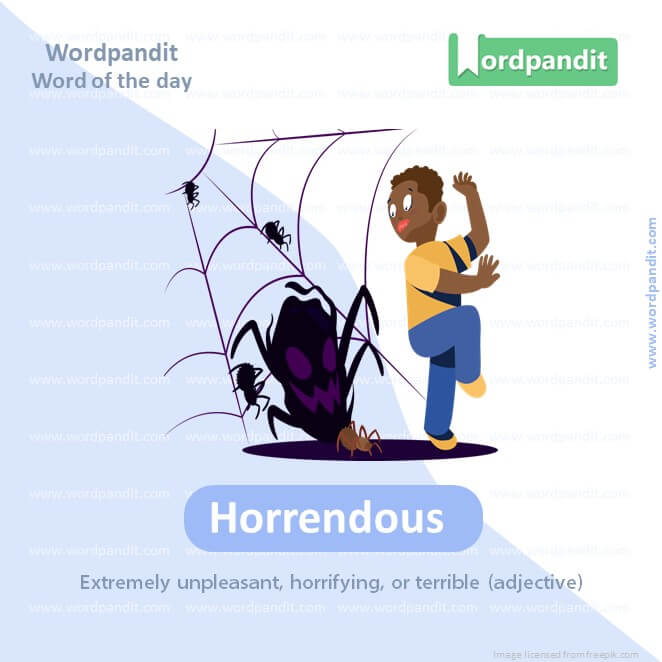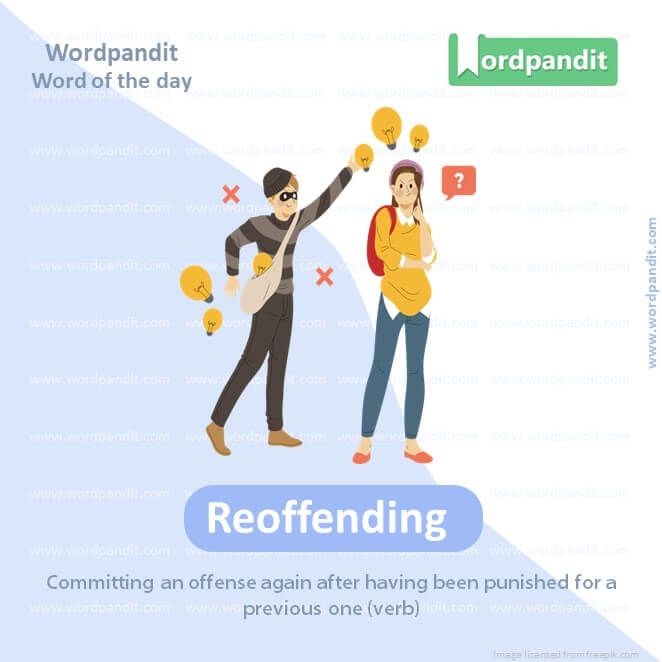Daily Vocabulary Words: List of Daily Used Words in Leading International Newspapers
Hi there. Welcome to this special section @ Wordpandit.
Our endeavour here is very simple: to highlight important daily vocabulary words, which you would come across in leading newspapers in the country. We have included the following newspapers in our selection:
• The New York Times
• The Washington Post
• Scientific American
• BBC
• The Guardian
• Psychology Today
• Wall Street Journal
• The Economist
We are putting in extensive work for developing your vocabulary. All you have got to do is be regular with this section and check out this post on a daily basis. This is your repository of words that are commonly used and essentially, we are posting a list of daily used words. Hence, this has significant practical application as it teaches you words that are used commonly in leading publications mentioned above.
Visit the website daily to learn words from leading international newspapers.

WORD-1: Horrendous
CONTEXT: committed yet another war crime of such horrendous nature and scale that it is destined to reverberate in memory and history.
SOURCE: Al Jazeera
EXPLANATORY PARAGRAPH: Imagine the scariest monster you can think of. When something is so bad or scary that it makes you say, “Oh no!”, that thing can be called “horrendous.”
MEANING: Extremely unpleasant, horrifying, or terrible (adjective).
PRONUNCIATION: ho-REN-dus
SYNONYMS: terrifying, dreadful, awful, shocking, appalling, ghastly, horrifying
USAGE EXAMPLES:
1. The storm last night was horrendous, with loud thunders.
2. The movie had a horrendous ending that made everyone cry.
3. The traffic on the way home was horrendous.
4. She woke up from a horrendous nightmare.

WORD-2: Blatant
CONTEXT: the grounds of a hospital in besieged Gaza that, bit by bit, is being erased in blatant acts of genocide.
SOURCE: Al Jazeera
EXPLANATORY PARAGRAPH: Imagine someone trying to hide a toy behind their back, but you can still see it. When something is really obvious and not hidden at all, we say it’s “blatant.”
MEANING: Very obvious and offensive (adjective).
PRONUNCIATION: BLAY-tent
SYNONYMS: flagrant, obvious, undisguised, overt, conspicuous, glaring, unmistakable
USAGE EXAMPLES:
1. The player’s blatant foul was caught by the referee.
2. It was a blatant lie, and everyone knew it.
3. She made a blatant mistake in her calculations.
4. The signs of the store’s closing sale were blatant.

WORD-3: Incarceration
CONTEXT: He is considered elderly in the prison system. That’s because incarceration accelerates aging.
SOURCE: New York Times
EXPLANATORY PARAGRAPH: Imagine there’s a big room with walls all around and a door that’s locked. When someone is kept inside that room and can’t come out, we say they are incarcerated. It’s like a timeout, but for grown-ups who have done something wrong.
MEANING: Being kept in a place, especially prison, as a punishment (noun).
PRONUNCIATION: In-car-suh-RAY-shun
SYNONYMS: Imprisonment, Detention, Confinement, Custody, Captivity, Internment, Lock-up
USAGE EXAMPLES:
1. The criminal faced ten years of incarceration for his crimes.
2. Many believe that rehabilitation is a better option than incarceration.
3. The novel detailed a young man’s experiences during his incarceration.
4. The effects of long-term incarceration can be detrimental to one’s mental health.

WORD-4: Vulnerable
CONTEXT: which houses former gang members and other vulnerable residents.
SOURCE: New York Times
EXPLANATORY PARAGRAPH: Think of a little chick without its mommy. It might feel unsafe because it’s small and alone. When someone or something can be easily hurt or harmed, we call it “vulnerable.”
MEANING: Able to be easily hurt or attacked (adjective).
PRONUNCIATION: VUL-ner-uh-bul
SYNONYMS: exposed, defenseless, unprotected, susceptible, weak, fragile
USAGE EXAMPLES:
1. Baby animals are vulnerable without their parents.
2. The castle’s walls were damaged, making it vulnerable to attacks.
3. He felt vulnerable after sharing his secrets.
4. Without an umbrella, she was vulnerable to the rain.

WORD-5: Reoffending
CONTEXT: The Department of Justice asserts that the risk of elderly people reoffending after release is minimal.
SOURCE: New York Times
EXPLANATORY PARAGRAPH: Imagine someone doing something wrong, like taking a cookie without asking. Then, after being told not to, they do it again. When someone does a bad thing again after already being told or punished, that’s “reoffending.”
MEANING: Committing an offense again after having been punished for a previous one (verb).
PRONUNCIATION: ree-oh-FEN-ding
SYNONYMS: relapsing, recommitting, repeating, backsliding, lapsing again
USAGE EXAMPLES:
1. The boy kept reoffending by breaking the same rule.
2. The program aims to prevent prisoners from reoffending.
3. Reoffending rates in the city have increased this year.
4. She worried that without guidance, he might reoffend.
WORD-6: Burdensome
CONTEXT: It is hardly burdensome; lab-test developers already have a professional responsibility to make sure that their own tests work.
SOURCE: Washington Post
EXPLANATORY PARAGRAPH: Imagine you’re carrying a super heavy backpack filled with rocks. It’s hard to carry, isn’t it? When something is really heavy or hard to deal with, we can say it’s “burdensome.”
MEANING: Causing difficulty or stress; heavy to bear (adjective).
PRONUNCIATION: BUR-den-suhm
SYNONYMS: onerous, taxing, heavy, troublesome, challenging, demanding
USAGE EXAMPLES:
1. The homework was so burdensome that she spent all weekend doing it.
2. Carrying all those groceries was a burdensome task.
3. The new rules felt burdensome to the employees.
4. It was burdensome to care for the old, broken-down house.
WORD-7: Proliferated
CONTEXT: they have proliferated and become more complex. And many laboratories have taken advantage of their latitude to use unregulated tests, bringing in specimens from doctors far and wide for evaluation.
SOURCE: Washington Post
EXPLANATORY PARAGRAPH: Imagine you have one toy car and suddenly, you have lots and lots of toy cars all over your room! When something grows or increases a lot and quickly, we say it “proliferated.”
MEANING: Increased rapidly in numbers; multiplied (verb).
PRONUNCIATION: pro-LIF-er-ay-ted
SYNONYMS: expanded, mushroomed, multiplied, exploded, boomed, spread, burgeoned
USAGE EXAMPLES:
1. The rabbits proliferated and soon there were many.
2. After the rain, mushrooms proliferated in the garden.
3. New businesses proliferated in the town over the summer.
4. The rumor proliferated quickly through the school.
WORD-8: Misdiagnosis
CONTEXT: But new tests benefit medicine only if they work; misdiagnosis raises the cost of health care.
SOURCE: Washington Post
EXPLANATORY PARAGRAPH: Imagine you have a toy that’s not working, and someone says it’s because of flat batteries. But actually, it’s because the switch is off. When someone guesses the wrong reason for a problem, in medicine or other areas, it’s called a “misdiagnosis.”
MEANING: Incorrect determination of the nature of a disease or problem (noun).
PRONUNCIATION: miss-dy-ug-NOH-sis
SYNONYMS: wrong diagnosis, mistaken identification, error, misinterpretation, misreading
USAGE EXAMPLES:
1. The misdiagnosis led to unnecessary treatments.
2. A common cold can sometimes be a misdiagnosis for allergies.
3. They sought a second opinion after the misdiagnosis.
4. Avoiding misdiagnosis is essential for proper medical care.
WORD-9: Credulously
CONTEXT: This “breaking news” was immediately, and credulously, picked up by Western news media.
SOURCE: Washington Post
EXPLANATORY PARAGRAPH: Imagine a friend tells you there’s a dragon in their backyard, and you believe them without seeing it yourself. When you believe things easily, even if they might not be true, you are acting “credulously.”
MEANING: Showing a tendency to believe things too quickly or easily (adverb).
PRONUNCIATION: kre-JOO-lus-lee
SYNONYMS: naively, gullibly, trustingly, unsuspiciously, uncritically
USAGE EXAMPLES:
1. She credulously accepted the story without asking questions.
2. He looked at the fake treasure map credulously.
3. Children often listen to tales credulously.
4. They nodded credulously when told about the supposed ghost in the mansion.
WORD-10: Verdict
CONTEXT: The definitive verdict has yet to be rendered, but it seems fair to say that Israel has a strong case.
SOURCE: Washington Post
EXPLANATORY PARAGRAPH: After playing a game, someone decides who wins and who loses. In a way, they are giving a “verdict.” It’s like a big decision or answer after thinking about something for a while.
MEANING: A decision on a disputed issue, especially in a legal case (noun).
PRONUNCIATION: VER-dikt
SYNONYMS: judgment, decision, ruling, resolution, conclusion
USAGE EXAMPLES:
1. The jury returned a verdict of “not guilty.”
2. After tasting both cakes, the verdict was that the chocolate one was the best.
3. The public awaited the court’s verdict on the high-profile case.
4. The doctor’s verdict was that he needed more rest.
vocabulary subject
The journey to become adept in any language, be it native or foreign, lies significantly in mastering the vocabulary subject. Understanding different words, their meanings, usage, and nuances drives effective communication and comprehension. But how should one precisely approach the vocabulary subject to maximize learning?
First, it’s essential to understand that the vocabulary subject isn’t a standalone part of language learning. It embeds itself within grammar, listening, speaking, reading, and writing skills. So, instead of rote memorization, integrating vocabulary learning into these activities offers practical exposure and application.
One effective method to navigate the vocabulary subject is to leverage the principle of repetition. Learning a new word once is not enough, and the key to effective retention is revisiting. It doesn’t mean you mechanically repeat words but rethink them in different contexts. Engaging with the word in different sentences, stories, or real-life conversations can enhance understanding and retention.
Next, the vocabulary subject often presents a challenge due to the sheer volume of words. The best approach here is prioritization. Focus primarily on frequently used words and phrases, gradually expanding your scope. Understand their meanings and try to use them in daily conversation. Progress may feel slow, but remember, it’s better to know 100 words you can use than 1000 words you can’t.
To add an element of fun while handling the vocabulary subject, try incorporating games like crossword puzzles, Scrabble, or word search. These keep the spirit of learning alive and can greatly increase your attention span.
Lastly, keep in mind that learning the vocabulary subject is a continuous process. The beauty of any language lies in its evolution, with new words and phrases being added regularly. So, embrace the journey of learning, stay patient and consistent, and you will undoubtedly conquer the fascinating world of vocabulary.











